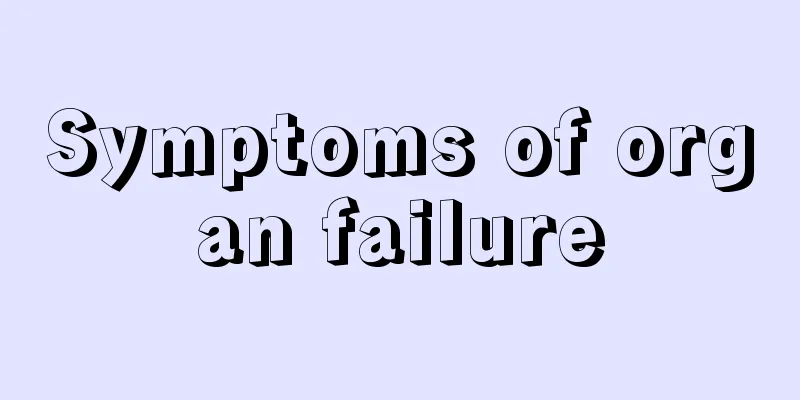Symptoms of organ failure

|
We all know that the internal organs of the human body are very important to the human body. Even if a certain organ has a small problem, it will make people feel very uncomfortable. However, when people reach old age, the functions of various organs in the body will gradually decline. At this time, it is very likely that organ decline will occur, and the human body will become worse and worse. So what are the symptoms of organ failure? The main symptoms of heart failure are difficulty breathing, wheezing, edema, etc., but sometimes it may manifest as other symptoms. When the patient shows the following four abnormal signals, be alert to the possibility of heart failure and go to the hospital for examination in time. Heart failure is congestive heart failure or heart failure. It is not an independent disease, but a serious stage of heart disease caused by various factors. At this time, the heart's blood discharge function is weakened due to disease, overwork, and blood discharge cannot meet the metabolic needs of organs and tissues. The main symptoms of heart failure are difficulty breathing, wheezing, edema, etc., but sometimes it may manifest as other symptoms. When the patient shows the following four abnormal signals, be alert to the possibility of heart failure and go to the hospital for examination in time. 1. Cough and wheezing are similar to bronchitis and asthma. Left heart failure often initially manifests itself as frequent dry coughs or chest tightness and wheezing, especially during activities and fatigue. Others suddenly wake up at night, feeling short of breath, and their symptoms gradually ease after they are forced to sit up. This is because left heart failure leads to pulmonary congestion, bronchial mucosal edema, and increased secretions, which obstructs respiratory ventilation. Since most elderly people have a history of chronic lung diseases (such as chronic bronchitis, emphysema, etc.), when heart failure presents with prominent respiratory symptoms, it is often misdiagnosed as bronchitis or asthma attacks. How to distinguish between the two? Cardiac cough and asthma are closely related to body position. The symptoms are severe when lying down and mild when sitting (standing), and they often occur at night. 2. Loss of appetite, abdominal distension, and diarrhea resemble gastroenteritis. This condition is mainly seen in right heart failure. Due to the obstruction of blood return from the right heart, the venous pressure of the systemic circulation increases, leading to blood stasis in the internal organs (gastrointestinal tract, liver, gallbladder, etc.), and symptoms such as loss of appetite, abdominal distension, nausea, and vomiting. In severe cases, ischemic spasm of gastrointestinal smooth muscle may also cause abdominal pain and diarrhea. If the medical history and physical examination are not conducted in detail (right heart failure generally has positive signs such as liver enlargement, lower limb edema, and distended neck veins), it is easy to be misdiagnosed as digestive tract diseases such as chronic gastroenteritis. 3. Oliguria and edema seem like kidney disease. Heart failure patients have reduced cardiac output, systemic blood stasis, reduced effective circulating blood volume, and insufficient renal blood flow, which leads to reduced total urine volume in 24 hours and relatively more nocturia. This is because when you lie flat at night to rest, the amount of blood returning to the heart increases and the kidneys function better than during the day. Unlike kidney disease, cardiogenic edema usually starts from the lower parts of the body (ankles, calves), while renal edema often appears on the face first. In addition, the urine routine of patients with cardiogenic edema is often normal, and they also have other symptoms and signs of heart failure. 4. Emotional or mental abnormalities are similar to senile mental illness or encephalopathy. Some elderly patients with heart failure have prominent mental symptoms, such as dizziness, insomnia, irritability, hallucinations, confusion and even coma. This is mainly because the elderly have varying degrees of cerebral arteriosclerosis and cerebral ischemia. In heart failure, the symptoms of cerebral ischemia are further aggravated due to the decrease in cardiac output. Of course, water and electrolyte imbalances secondary to heart failure cause abnormal brain metabolism, which is also an important cause of mental disorders. If you are not careful in differentiation, it can easily be misdiagnosed as senile mental illness, stroke, brain tumor, etc. |
<<: Consequences of low creatinine
>>: Symptoms of lower limb muscle weakness
Recommend
Treatment of impotence should start with diet
Nowadays, many men have been troubled by sexual d...
What happens if you take too much antipyretic medicine
If the number displayed when measuring body tempe...
How to clean candle oil dripping on clothes
When celebrating birthdays, people often eat cake...
What to do if an adult has a fever and is afraid of the cold
Adults, as you grow up, all aspects of your body&...
How to dry lemon slices
Many people like to eat some lemons in their dail...
What can be cured by chopping ginger and putting it in the navel
Everyone is very familiar with ginger. Many peopl...
What factors are related to prostate cancer?
What factors are related to prostate cancer? Pros...
What are the common symptoms of lung cancer
Lung cancer has brought certain impacts to our li...
What are the early symptoms of osteosarcoma
Osteosarcoma is a tumor disease that is extremely...
The advantages and disadvantages of foot soaking in summer
Soaking your feet regularly before going to bed c...
Radiation therapy for esophageal cancer
The sensitivity of esophageal cancer to radiother...
Will eating figs cause internal heat?
Figs can improve your sub-healthy physical condit...
What are the symptoms of gastritis
Gastritis is a general term, which is divided int...
How to completely treat glioma
Glioma is a brain tumor disease that has been pla...
Can baking soda whiten teeth?
Can soda really whiten teeth? If soda can't w...









